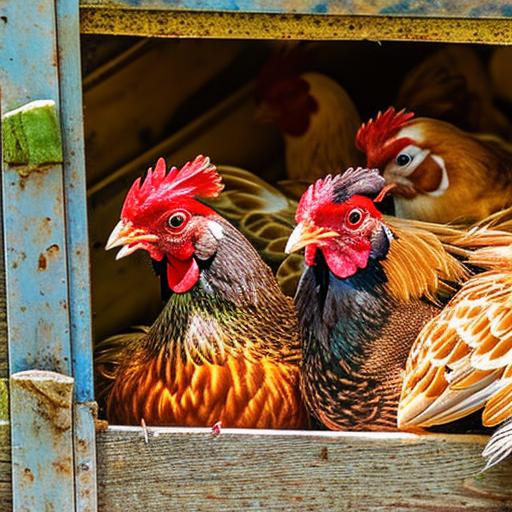Keeping chickens in a coop for a week can be a great way to provide them with a safe and comfortable environment. It allows them to be protected from predators and harsh weather conditions, while also giving them a designated space to roam and explore. However, before embarking on this endeavor, there are several factors to consider. This article will discuss the benefits of keeping chickens in a coop, as well as the important factors to consider before doing so.
Key Takeaways
- Keeping chickens in a coop has many benefits, including fresh eggs, natural pest control, and fertilizer for your garden.
- Before keeping chickens in a coop for a week, consider factors such as space, climate, and local regulations.
- To prepare the chicken coop for a week-long stay, clean and disinfect it, provide bedding and nesting boxes, and ensure adequate food and water.
- Choosing the right chicken coop for a week-long stay involves considering factors such as size, materials, and security.
- Feeding and watering chickens in a coop for a week requires providing fresh water and a balanced diet, and monitoring their intake.
Benefits of Keeping Chickens in a Coop
One of the main benefits of keeping chickens in a coop is protection. A coop provides a secure and enclosed space for chickens, protecting them from predators such as foxes, raccoons, and even neighborhood dogs. It also protects them from harsh weather conditions such as extreme heat or cold, heavy rain, or strong winds. By keeping chickens in a coop, you can ensure their safety and well-being.
Another benefit of keeping chickens in a coop is that it provides them with a comfortable environment. A well-designed coop will have enough space for the chickens to move around freely, stretch their wings, and engage in natural behaviors such as scratching and dust bathing. It will also have nesting boxes where they can lay their eggs and perches where they can roost at night. By providing these amenities, you are creating an environment that mimics their natural habitat and allows them to live happily and comfortably.
Factors to Consider Before Keeping Chickens in a Coop for a Week
Before keeping chickens in a coop for a week, there are several factors to consider. Firstly, you need to ensure that the size of the coop is appropriate for the number of chickens you have. Chickens need enough space to move around comfortably and engage in natural behaviors. Overcrowding can lead to stress, aggression, and health issues. As a general rule of thumb, each chicken should have at least 4 square feet of indoor space and 10 square feet of outdoor space.
Another factor to consider is the availability of food, water, and proper cleaning. Chickens need to be fed and watered daily, so you need to have a plan in place for providing them with enough food and water for the duration of their stay in the coop. Additionally, the coop needs to be cleaned regularly to maintain cleanliness and prevent the spread of disease. This includes removing any waste and replacing bedding as needed.
Preparing the Chicken Coop for a Week-long Stay
To prepare the chicken coop for a week-long stay, it is important to start by cleaning and disinfecting the coop. Remove any old bedding, debris, or waste from the coop and thoroughly clean all surfaces with a mild detergent or disinfectant. This will help eliminate any bacteria or parasites that may be present.
After cleaning, provide fresh bedding for the chickens. Straw or wood shavings are commonly used as bedding material. Make sure to provide enough bedding to keep the chickens warm and comfortable throughout their stay. Additionally, ensure that there are enough nesting boxes for the chickens to lay their eggs. Each chicken should have access to at least one nesting box.
Choosing the Right Chicken Coop for a Week-long Stay
When choosing a chicken coop for a week-long stay, it is important to consider the size and design of the coop. The coop should be spacious enough to accommodate the number of chickens you have, allowing them to move around freely and engage in natural behaviors. It should also have proper ventilation to ensure fresh air circulation and prevent the buildup of ammonia from chicken waste.
Additionally, consider the materials used in the construction of the coop. It should be sturdy and secure, able to withstand predators and harsh weather conditions. The coop should also have a secure door or latch system to prevent any unwanted entry.
Feeding and Watering Chickens in a Coop for a Week

Feeding and watering chickens in a coop for a week requires careful planning and preparation. Ensure that you have enough food and water containers to accommodate the number of chickens you have. Chickens should have access to fresh water at all times, so make sure to provide enough water containers and refill them regularly.
When it comes to feeding, chickens require a balanced diet that includes grains, protein, and fresh fruits and vegetables. You can provide them with commercial chicken feed or create your own feed mix. Make sure to provide enough food for the duration of their stay in the coop and monitor their food intake to ensure they are getting enough nutrients.
Maintaining Cleanliness in the Chicken Coop for a Week-long Stay
Maintaining cleanliness in the chicken coop is crucial for the health and well-being of the chickens. Regular cleaning is necessary to prevent the buildup of waste and bacteria. Remove any waste or soiled bedding from the coop daily and replace it with fresh bedding. This will help keep the coop clean and prevent the spread of disease.
Additionally, disinfect the coop regularly to eliminate any bacteria or parasites that may be present. Use a mild detergent or disinfectant to clean all surfaces, paying special attention to areas where waste accumulates, such as perches and nesting boxes.
Ensuring Adequate Ventilation and Lighting in the Chicken Coop
Adequate ventilation and lighting are essential for the health and well-being of chickens in a coop. Proper ventilation ensures fresh air circulation, removes excess moisture, and prevents the buildup of ammonia from chicken waste. This can be achieved by providing windows or vents in the coop that can be opened or closed as needed.
Natural lighting is also important for chickens as it helps regulate their internal clock and promotes healthy egg production. Make sure that the coop has windows or skylights that allow natural light to enter during the day. If natural light is not sufficient, you can also provide artificial lighting to ensure that the chickens have enough light.
Monitoring the Health of Chickens in the Coop for a Week
Monitoring the health of chickens in the coop is crucial to identify any signs of illness or injury. Regularly check the chickens for any abnormalities such as changes in behavior, loss of appetite, or physical injuries. If you notice any signs of illness or injury, it is important to take immediate action and provide appropriate treatment.
Having a plan in place for treating any health issues that may arise is also important. This can include having a first aid kit on hand with basic supplies such as bandages, antiseptic ointment, and wound care products. Additionally, it is a good idea to have contact information for a veterinarian who specializes in poultry in case professional help is needed.
Is it Safe to Keep Chickens in a Coop for a Week?
Keeping chickens in a coop for a week can be safe and beneficial if proper preparation and monitoring are done. The benefits of keeping chickens in a coop include protection from predators and harsh weather conditions, as well as providing them with a comfortable environment. However, it is important to consider factors such as the size of the coop, availability of food and water, cleanliness, ventilation, and lighting before keeping chickens in a coop for a week.
By properly preparing the chicken coop, providing adequate food and water, maintaining cleanliness, ensuring proper ventilation and lighting, and monitoring the health of the chickens, you can create a safe and comfortable environment for them. With proper care and attention, keeping chickens in a coop for a week can be a rewarding experience for both you and your feathered friends.
If you’re wondering about keeping chickens in the coop for a week, you might find this article on chicken coop interior ideas from Poultry Wizard quite helpful. They provide some great tips and inspiration for creating a comfortable and functional space for your feathered friends. From nesting boxes to perches and ventilation, this article covers it all. Check it out here for some fantastic ideas to enhance your chicken coop!
FAQs
What is a chicken coop?
A chicken coop is a shelter or housing structure specifically designed for chickens to live in. It provides a safe and secure environment for chickens to lay eggs, roost, and rest.
Can chickens be kept in the coop for a week?
Yes, chickens can be kept in the coop for a week. However, it is important to ensure that the coop is clean, well-ventilated, and has enough space for the chickens to move around. It is also important to provide them with food and water.
How often should the coop be cleaned?
The coop should be cleaned regularly to maintain a healthy environment for the chickens. The frequency of cleaning depends on the number of chickens and the size of the coop. Generally, it is recommended to clean the coop at least once a week.
What should be included in a chicken coop?
A chicken coop should include nesting boxes for the chickens to lay eggs, roosting bars for them to perch on, and a feeder and waterer. It should also have good ventilation and be predator-proof.
How much space do chickens need in a coop?
Chickens need at least 2-3 square feet of space per bird in the coop. However, it is recommended to provide them with more space if possible to prevent overcrowding and promote healthy living conditions.
What should I feed my chickens?
Chickens should be fed a balanced diet that includes a combination of grains, protein, and vitamins. Commercial chicken feed is available and can be supplemented with fresh fruits and vegetables. It is important to provide them with clean water at all times.
Meet Walter, the feathered-friend fanatic of Florida! Nestled in the sunshine state, Walter struts through life with his feathered companions, clucking his way to happiness. With a coop that’s fancier than a five-star hotel, he’s the Don Juan of the chicken world. When he’s not teaching his hens to do the cha-cha, you’ll find him in a heated debate with his prized rooster, Sir Clucks-a-Lot. Walter’s poultry passion is no yolk; he’s the sunny-side-up guy you never knew you needed in your flock of friends!







